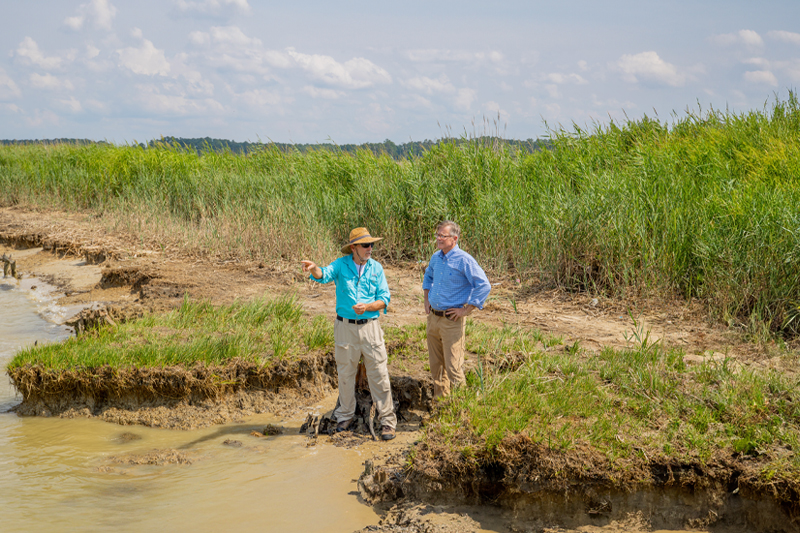
Above: Professors Gary Whiting and Rob Atkinson, Ragged Island.
Read time:
Nestled along the James River just a few miles from campus lies Ragged Island, a 1,500-acre marsh ecosystem grappling with rapid erosion. A long, rustic boardwalk winds through the marsh, carrying visitors down to the water’s jagged edge – an area that has receded a whopping 280 feet in recent decades. It’s a level of erosion that has directly impacted the wetland habitat and its wildlife.
Organismal and Environmental Biology professors Dr. Rob Atkinson and Dr. Gary Whiting have spent years doing research in this wetland area. They have observed the high rates of erosion along the James River shoreline that has led to widespread loss of the salt marsh ecosystem. Both fear that without substantial intervention, the marsh—and animals supported within— may disappear from our local coastal region.
“Over the past 20+ years I have brought my Ecology class to sample in the marsh, and have noticed that a piece of Ragged Island goes missing each year,” said Dr. Whiting.
Some help is on the way in the form of an $8 million grant designed to protect and enhance the Ragged Island area, awarded to the Virginia Department of Wildlife Resources by the National Oceanic and Atmospheric Administration (NOAA). Dr. Atkinson’s portion of the grant will be used for an initiative focused on research, education and community engagement. The project will give Christopher Newport students and faculty the opportunity to not only conduct research, but to mentor hundreds of local high school students from Newport News and Isle of Wight County on field trips and data collection.
“Our students and faculty are excited to partner with the Virginia Department of Wildlife Resources, and the non-profit conservation group, Ducks Unlimited, on this important project, which is located close to our campus,” Atkinson said. “We’re looking forward to partnering with local students from Newport News and Isle of Wight, who will help us tell this conservation story.”
Environmental Science graduate student Jordan Williams is eager to help tell that story. Alongside faculty, Williams will take the lead with fellow CNU students on the messaging about why marsh restoration and shoreline protection matters.
“Salt marshes are important for coastal communities for so many reasons! These wetlands have a unique ability to protect property from shoreline erosion and flooding, filter polluted water, and provide critical habitat for a variety of species,” Williams said. “However, coastal ecosystems throughout the Chesapeake Bay are under threat, particularly at Ragged Island where the shoreline is receding several feet every year.”
Christopher Newport students will gain hands-on experience protecting the marshes, doing everything from measuring plants to netting and documenting marine species. Williams says she’s excited to build on the success CNU has had with other hands-on learning projects, like Fear to Hope. Fear to Hope is the umbrella collaborative research project in which CNU partners with local, regional and national high schools to conduct authentic research to address climate change. The first collaboration of Fear to Hope focused on Atlantic white cedar and wetland habitats. The current collaboration is focused on marsh grass, oysters and Ragged Island.
“Many students prefer hands-on learning opportunities, and we've already had great success getting students involved in hands-on science projects through our study on ghost forest development by testing the salt tolerance of Atlantic white cedar inside of classrooms,” Williams said. “The students were able to participate in the year-long study, engage with CNU students like me, and present their findings to other students and environmental science professionals at the annual Fear to Hope Symposium. We will continue to work with students to test the salt tolerance of Atlantic white cedar while adding the Ragged Island salt marsh study as another branch of the Fear to Hope project. We are particularly excited about the field component of this study, which will give the students even more opportunities to learn about conservation through authentic research.”
Work on Ragged Island will begin this fall. Interested students can contact Dr. Atkinson.